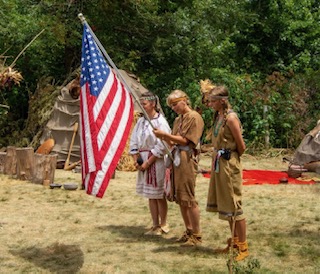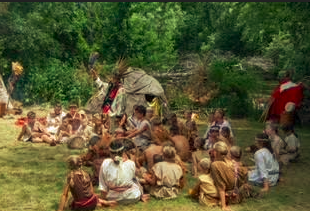
- Details
- By Neely Bardwell
Guest Opinion. Michigan is known for its top vacation spots with sandy beaches on the Great Lakes, but a small town 50 miles inland, in the state, near Grand Rapids, is making itself known for something a little different: racism.
Lowell, Michigan is a town of just over 4,000 people and was the setting of “The River Time Pageant” on Saturday. The ‘pageant’ is put on by the small town’s Historical Museum and the Alto Community Achievers Club. This ‘pageant’ is an attempt at a historical reenactment of the town’s local history. Unfortunately, with a side of racism.
Odawa people once lived on the land now called Lowell where they had interactions with the French fur traders Madame LaFramboise and Daniel Marsac. This watered-down history is what the ‘pageant’ sought to portray.
A friend sent me more than 400 photos of the reenactment. The intention was to provide a historically accurate portrayal, but to me, an Odawa woman, all I saw was a huge display of ignorance, racism, and cultural appropriation.
For the pageant, white people dressed in what they assume to be ‘authentic Native outfits.’ They took to the fairgrounds to run around and pretend to be Indian for a day. How fun it would be to be able to just ‘be Native’ for a single day.

I’m from this small town. My childhood home is in Lowell where I grew up and attended the public school system. So, my ties are in this community. This community describes itself as “welcoming,” but how welcoming is it if they still have events that center around the cultural appropriation of our Native traditions?
Our family was the only Native family in Lowell that I knew of. As I grew up, my mother served on the tribal council for the Little Traverse Bay Bands of Odawa Indians. Many of my early teachings I learned from her and my community.
For me, this community was never fully welcoming. In second grade, I remember reading about Native American history. In one chapter I read the history was inaccurate and used outdated language to refer to my people. I remember raising my hand and informing the class of this and getting scolded by the teacher for questioning the lesson. Who was I, a seven year old Native girl, to question the teacher on the white washed history of my own people?
I remember in middle school, an eighth-grade U.S. history class, getting to the chapter on Native history and having all the kids turn to look at me as soon as the word “Indian” was read aloud as if they were waiting for me, daring me to speak up.
I remember in high school we, once again, reached the single page, on Native history. Once again everyone turned to look at me, the only Native person in the class. The teacher questioned why the other students did this. I was forced to speak up against the inaccuracies being taught, only to have my knowledge on this topic be questioned.
I remember getting ridiculed for being Native by my white peers. I remember being told that I was “pretending to be oppressed” and once I got accepted to attend Michigan State University I was told “you only made it into college because you’re brown” by whom I thought were close friends. I remember students coming to me and claiming their grandmother was an ‘Indian Princess.”
It does not surprise me that this town engages in blatant racism and large scale cultural appropriation because the history being taught to the children of this town in school is incomplete and inaccurate. However, I am no less disappointed and angry by what happened on Saturday.

They claim that they are only trying to inform the public of the town’s history, but this ‘pageant’ is a racism fest masked as a historical teaching event. Seeing the photos of my culture, my people, being horribly portrayed reminded me just how “welcoming” my hometown was and continues to be.
The beginning of the play featured three white children, costumed as Natives, holding the United States flag while the National Anthem played. This play could not have made a bigger mockery of the attempted genocide and assimilation our people have faced. There is no way that this play can be seen as respectful or honoring.
The twelve federally recognized tribes of Michigan, and the four state recognized tribes, are not elusive entities. Part of the Lowell Area Historical Museum’s due diligence while planning this event should have been to contact each and every one of these tribes.
But why would they have done that when their only goal was to appropriate our culture and continue to push the myth that our people are inferior? This country tried to destroy our culture and communities, and now they want to pretend to be us.
Thank you Lowell, Michigan for reminding us that racism is alive and well.
More Stories Like This
The SAVE America Act Threatens Native Voting Rights — We Must Fight BackThe Presidential Election of 1789
Cherokee Nation: Telling the Full Story During Black History Month
Jesse Jackson Changed Politics for the Better
Native News Online at 15: Humble Beginnings, Unwavering Mission
Help us defend tribal sovereignty.
At Native News Online, our mission is rooted in telling the stories that strengthen sovereignty and uplift Indigenous voices — not just at year’s end, but every single day.
Because of your generosity last year, we were able to keep our reporters on the ground in tribal communities, at national gatherings and in the halls of Congress — covering the issues that matter most to Indian Country: sovereignty, culture, education, health and economic opportunity.
That support sustained us through a tough year in 2025. Now, as we look to the year ahead, we need your help right now to ensure warrior journalism remains strong — reporting that defends tribal sovereignty, amplifies Native truth, and holds power accountable.
 The stakes couldn't be higher. Your support keeps Native voices heard, Native stories told and Native sovereignty defended.
The stakes couldn't be higher. Your support keeps Native voices heard, Native stories told and Native sovereignty defended.
Stand with Warrior Journalism today.
Levi Rickert (Potawatomi), Editor & Publisher

